July 11th, 2020 - Barcelona, Spain
👋 Greetings to the new followers and shoutout to Bonnie and Simone for becoming paid subscribers!
I’m writing this from Barcelona where we are spending a few days before heading back to Connecticut tomorrow. I’m looking forward to seeing family again since last being back in January.
If you’d like to subscribe or upgrade to become an ongoing patron of the newsletter, you can do this here before you dive into this week’s issue:
#1 A Call To Create
I’ve written a lot about how I came to see myself as a worker and my journey towards something else, but I haven’t written much about why this new path - an internet mediated existence - seems so natural.
Within the last six months as I’ve gotten involved in some of the most interesting work of my career, all on the internet, its become more clear that working online, using technology and making friends digitally is not something I’ve had to learn how to do, its something I’ve always done.
I thought it might make sense to explore this for issue #100 and also make the case why you should come join me.
Writing this I decided to reflect on all the different things I was involved in online at an early age and its noticeable that this list is longer that my actual resume:
Reading DOS for dummies with my dad in the early 1990s and being energized by the ability
Teaching myself HTML and spending way too much time creating buttons on a website that changed the background colors
Role playing wresting league via AOL emails and chat rooms
Dabbling with proggiez on AOL
Participating in and then running several fantasy basketball leagues
Building an affiliate website for banner ad viewing software and making some of my first money on the internet
Buying, selling and trading beanie babies on ebay in the late 1990s
Creating a website in high school that would predict snow days and assess my accuracy titled “Paul Says it Will”
Forming a blog with friends freshman year of college titled “S4” that led to slight fame within a couple dorm buildings at UConn
Using my USB turntables in college to put out several mixes under the banner “DJ PoPo Shizzle”
Blogging on Tumblr for several years, anonymously
This “experience” gave me an enormous advantage when I entered the corporate world in 2007. Most of the people I was working with could barely use computers and I spent the first three years of my career automating most of my work. I got several awards for these efforts and had pretty good work-life balance.
As time went, the tools got simpler and you no longer needed to be a borderline hacker to get basic technology to work for you. My advantages in the corporate world were diminished and I had to play the same games as everyone else.
If I graduated 10 years later, I would have ended up in the technology industry, but that path was not obvious to someone graduating in 2007. I tried and failed to get hired at google out of college and then moved on.
Over the last three years on my self-employed journey I’ve started to remember that as a child I spent tons of free time exploring the internet and creating things online. As I’ve experimented with podcasts, writing, online courses and building websites, I’ve re-ignited my love of technology in ways that have also enabled me to financially keep the journey going. It seems unfair sometimes that I’m having so much fun.
Why are so many scared to share online?
Yet it was not until the last year that I overcame a deep shame and embarrassment of sharing online. My first podcast episode was released with dual feelings of excitement and shame.
Who am I to be doing this?
Every time I shared an essay I wrote, especially if I put the link on facebook, I would be deeply afraid of potential negative comments or unspoken thoughts. Share long enough on the internet and you eventually do receive contempt:
How can you be talking about this stuff?
These questions are part of a deeply embedded script that many of us have. It’s an industrial age script that says you should only be able to speak out if you have the proper role, credential or status.
In case you forget, publications like the New York Times and others regularly remind us to stay in our place.
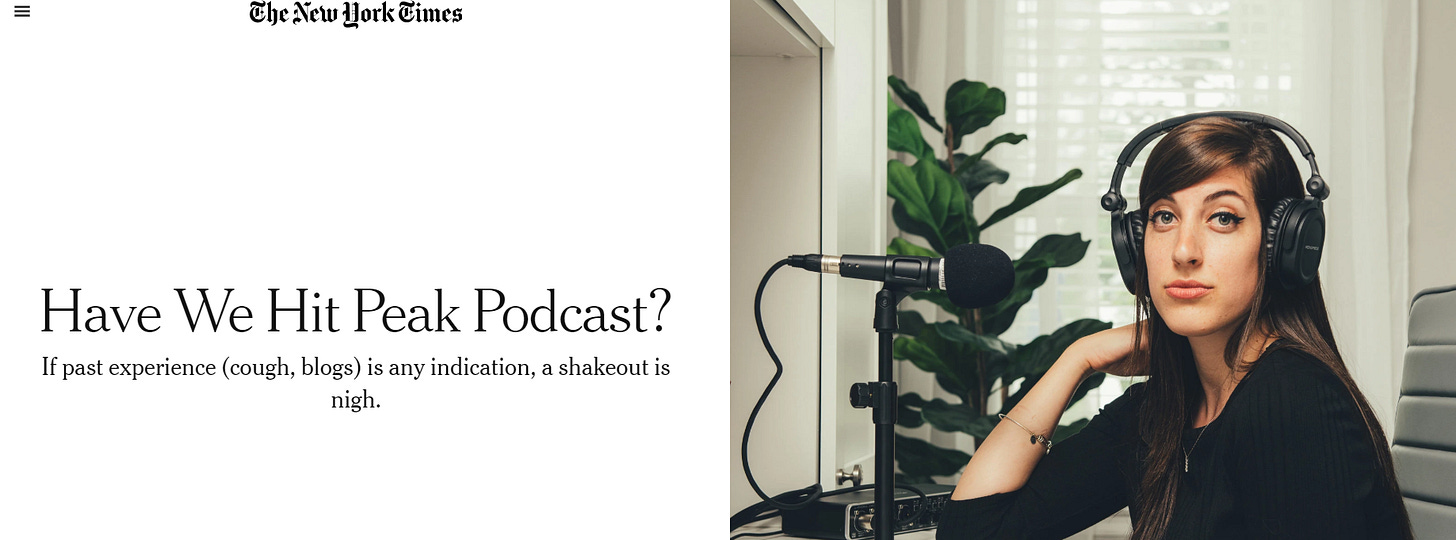
In the piece we find a quote from an Academic who outlines the risks of allowing just anyone to communicate with the world:
“Being a podcast host plays into people’s self-importance,” said Karen North, a clinical professor of communication at the Annenberg School for Communication and Journalism at the University of Southern California. And it projects that importance to others. Public speaking and consulting gigs now often go to “the person who’s the expert and has the podcast,” she said.
“The thing about podcasts,” Dr. North added, “is that it’s very, very hard to determine popularity. It’s easy for the host to appear to be an influencer. And whether anybody finds that podcast or listens to it and the bounce rate — who knows?”
It would probably seem crazy to North that one might use a podcast as a way to learn, connect and become an expert rather than trying to obtain the proper title first.
The essay does make a good argument that too many people get into podcasting with hopes of becoming rich or famous but I think that is a symptom of a deeper issue of the idea that we should try to make money from everything we do.
Anyone who creates a podcast, writes on the internet or shares other creations online over a long enough time, eventually figures out the secret:
The benefit of a creative journey is the path itself. If you can find a creative journey you want to be on, then the opportunities that emerge will also be the ones you want to work on too.
While creating online is certainly hackable, if you end up doing something you don’t like doing, its just not going to last.
Which is why I want to make the case for more people to create online
There are many people creating online in bad faith. If you want a shocking deep dive into some of these people, just check out the Coffeezilla YouTube channel.
If you use Instagram, Facebook or twitter you will eventually run across one of these people. They typically use things like staged lambo and private jet photo shoots to link the idea of instant wealth and get rich quick schemes with their services.

However, the takeaway most people have is that most people writing on the internet are trying to take advantage of people, therefore I should not share my own work.
The antidote to these bad faith actors is not less sharing, it’s more, and its one of the things I am most passionate about.
Everyone is afraid of being a hustler. We live in a time in which working at a company like Wells Fargo, despite them continuously defrauding customers over years, still gets more respect than someone on instagram selling their artwork.
This is madness.
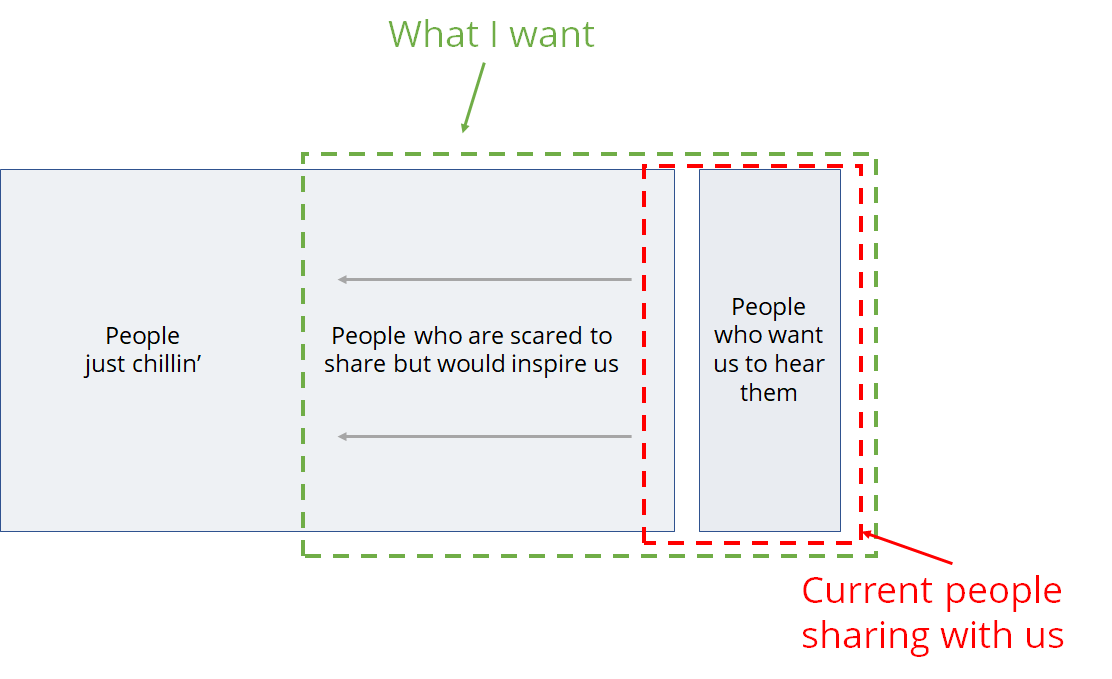
The reason I am so excited about everyone creating online now is that you no longer need to be like me. You don’t need to be able to hack together clunky systems online to create online. Here are a some free tools you can get started with in less 1 hour:
Substack: easy e-mail newsletters that you can monetize
Carrd: simple one-page landing pages or websites
Medium: low friction sharing of writing
Notion: simple collaborative webpages, writing or tools like to-do lists
Anchor + Audactity: free podcasts recording, editing + hosting
Canva: Easy & good looking graphics
Gumroad: Sell digital products
Squibler Writing Prompt: Challenge yourself to 5-minutes of continuous writing
Hemingway App: Free writing editor
5 years ago there were two good excuses to staying silent: the technology and fear of what others might say. The technology one is no longer a good excuse. What others might say? Still an issue, but even that is not what you think…
What will my friends say?
You are writing for yourself. Don’t try to visualize the great mass audience. There is no such audience—every reader is a different person. Don’t try to guess what sort of thing editors want to publish or what you think the country is in a mood to read. - William Zinnser
Most of them won’t say anything and the ones that do say something will mostly encourage you.
I have one friend, Jordan, who doubles as my most optimistic friend who has given me 142 compliments over the past few years. Even if my work doesn’t deserve that much praise, consistently creating work gives others an excuse to reach out and stay connected. You will be surprised that you probably have at least one Jordan in your social circle.
Most of the people I talk to about my writing are new friends, people that resonate deeply with what I’m writing and share a similar path or interest in what I write about. These people are diverse and interesting. Employed, unemployed, retired, founders, employees, solo creators and students from many countries around the world. I would never have met any of these people if I had never started sharing.
One of the most surprising things is the number of people in their 50s, 60s and 70s who have reached out and given me support. Many of them are either trying to reinvent their path towards the next phase of their life or struggled to “find the others” during their own off-the-default path journeys and are making up for lost time.
I was scared to share publicly because I accepted the common knowledge of the Boston/NYC knowledge worker bubble. In this context, writing online doesn’t help you land a higher salary or a better job (though this is changing) so its a waste of time.
Once you earn the right title, then you can write.
At BCG, I wrote 75% of a major report for them but when it came time to put authors names on the cover, they put four Partners. I didn’t even ask to be listed as an author because I was scared I would be laughed at.
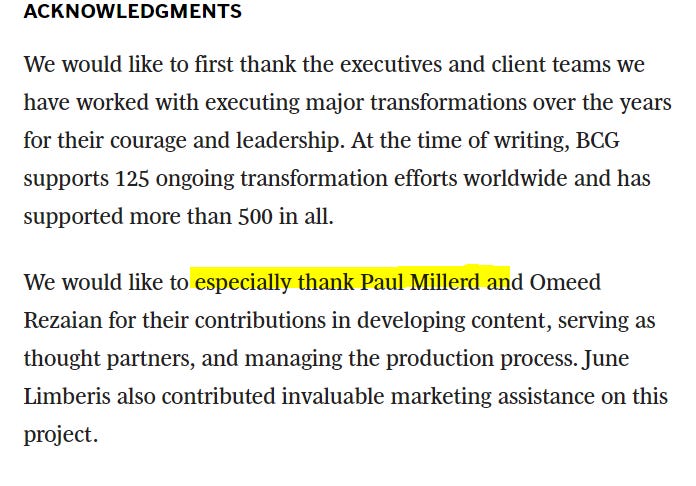
It was obvious that one should not dare to share their thinking publicly.
Yet starting in 2015, I started using LinkedIn’s new article feature and was surprised what happened next. Instead of getting told to stand down by people I worked with, no one said anything and random people in New York reached out to me to connect and have coffee. Those first few articles I shared on LinkedIn helped me make real-life friends.
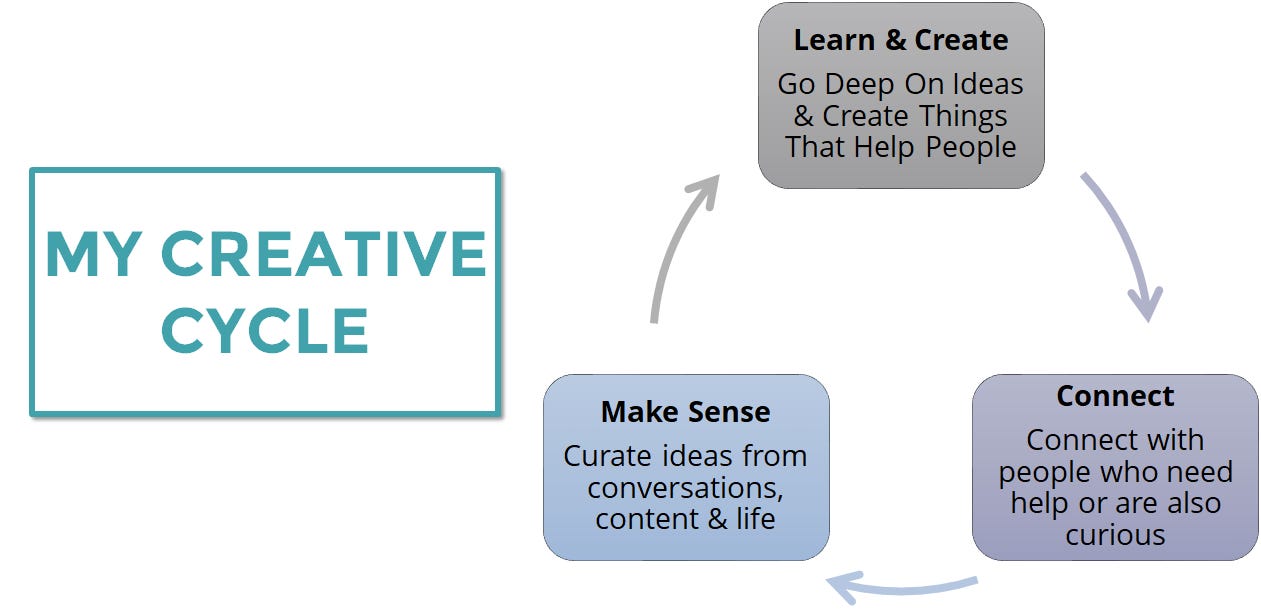
After making a friend through my writing, I was hooked. It was a journey I wanted to keep going on.
Writing + creating online has many more positive downstream effects
I’m going to talk about writing because that’s the one thing I’ve been doing most consistently since I became self-employed but many of these hold for podcasts, apps, tools, videos and crafts you can share online.
Benefit #1: See the flaws in your own thinking and start to see the nuance (or lack thereof) in other’s point of views
It’s one thing to espouse a belief in a discussion with friends over a beer and another thing entirely to try to turn that into a coherent essay. As I started writing, I started to see how I was able to develop much better ideas through writing.
Paul Graham has written on this:
Having good ideas is most of writing well. If you know what you're talking about, you can say it in the plainest words and you'll be perceived as having a good style. With speaking it's the opposite: having good ideas is an alarmingly small component of being a good speaker.
As we move to a new future where people communicate digitally, writing is going to be more important than ever. The effects of charisma, height, looks and size will not hold the same sway and more attention will be paid to quality of ideas.
Benefit #2: It can act as a “business card” on a topic a sort of proof-of-insight that is increasingly more useful for employment and opportunity than in the past
I got paid to write a chapter on culture for the Holloway Guide To Remote Work because I used an essay I wrote to demonstrate credibility. I went from tweet to hired in less than 24 hours. This was the second time I’ve been paid to write. In both cases, it was a single essay which gave me the “proof” that I was right for the job, not a resume or past work experience.
Benefit #3: I’m able to be more generative of ideas and able to learn more than I did in the past
“You’re much more likely to spot surprising relationships and to see fresh connections among ideas, if your mind is constantly humming with issues related to your work. When I’m deep in a project, everything I experience seems to relate to it in a way that’s absolutely exhilarating” - Gretchen Rubin
With a steady writing and creation habit, it narrows my attention to things that I’ve written about, am curious about or want to learn more about. By taking notes on these things, it enables me to learn things in a way I never did before.
Benefit #4: As many have found, writing can be something that is intrinsically rewarding because it is hard and getting better takes a lot of reps
Many people search for years trying to find a perfect job or “passion.” I don’t really think either is realistic for most people. A better approach is to find something you want to keep doing. I find writing this newsletter immensely rewarding and expect to keep doing it for a long time.
How do you find things to write about or keep a creation habit going?
“professional success…you get a style and run that to the ground and turn that into a cash cow and don’t change…and let that run endlessly, which is the opposite of personal growth, which is you’re always learning, you’re always growing” - Austin Kleon
At the beginning I showed you why creating online might be more natural and fun for me. Regardless, I’ve realized many things during this journey that can help you sustain this path if you choose to embark on it:
Find the “others” to help you stay energized: Find others online who are interested in the same things. Given how few people still share their writing online, you are not in fact competitors. You can learn from each other, work on things together and help make each other better. Twitter is the best place to find other interesting creators right now.
Create and then do 99 more: As friend of Boundless, Visa Veerasamy, says “do 100,” meaning create 100 of the thing you are doing. There is a lot of wisdom in this advice. Many people want instant feedback and if they don’t get it, want to quit. I think the takeaway is probably that you’re in it for the wrong reasons or you haven’t gone deep enough. Write or create 95 more and then reassess. A surprising amount of magic emerges when you do 100 of a thing.
Remember that unbelievable amounts of wisdom remains unshared: There are about 5-10 interesting writers focused on the future of work writing on the internet that I follow. I wish there were at least 10x that many. I continue to write about these things because I think I can add something to the conversation. Find an area where you think that people don’t have the full picture. We need more voices, not less.
Understand the medium and the incentives of platforms: Writing is perhaps the most raw way to share and communicate online. If you are writing personal essays or nonfiction its hard to hide what you think and feel. However, there are inevitable traps that are easy to fall into such as click-bait headlines and other content tricks.
Other mediums like photo and video (ahem, Instagram) nudge you in a direction to create a persona that may not align with who you are. I’ve met a few Instagram influencers that despise the way they have to behave to keep it going.
Podcasting is perhaps the best “pure” medium because the analytics are so bad that gaming the platform for attention is not very easy. Find the platform that works for the life you want to create.
Creating online is a way of combining understanding + hope
“Creativity by nature is an act of boldness and rebellion.” -Robert Greene
“Creativity requires faith. Faith requires that we relinquish control.” Julia Cameron
“The true scholar grudges every opportunity of action passed by, as a loss of power.” - Ralph Waldo Emerson
It takes almost no courage to denounce something you disagree with or post your hatred of something online. This is the trap of our modern times. It is the feeling of action and participation without action.
This makes me sad because all I see is the latent energy of curious and creative people who don’t have an outlet. We want to matter. Social media gives us the cheap version of mattering - one that doesn’t last.
Writing has had a huge impact on my life. Essays from individuals on the internet have change how I thought about things. To me, these people matter. Here are some examples:
William Deresiewicz made me rethink leadership, friendship & solitude
Dan Wang changed how I thought about the link between optimism & manufacturing
Ramesh A Nagarajah changed how I thought about my friends of a different race from his essay on being the “token black guy”
Rebecca Solnit changed how I thought about the mystery of life
Morgan Housel made me feel grateful to be alive
Andrew Taggart forced me to stare reality in the face
Rusty Guinn gave me hope on a positive version of work for the future
Tom Critchlow and Venkat Rao showed me there were other nerds on the internet who write about the art of consulting
Wes Yang on the role of Asians in America
Maria Popova continues to show that themes like love, hope, despair and the desire to create have existed throughout history and continue to shape us
Speaking of Popova, in an interview with Krista Tippett makes the connection between hope and cynicism:
I think a lot about this relationship between cynicism and hope. Critical thinking without hope is cynicism. But hope without critical thinking is naïveté. I try to live in this place between the two, to try to build a life there, because finding fault and feeling hopeless about improving our situation produces resignation of which cynicism is a symptom and against which it is the futile self-protection mechanism.
When I first started writing, I was driven by frustration. Frustration that the current business world did not take good ideas seriously. As I wrote, I realized it was much harder than I thought to articulate these ideas, but that if I kept writing, my thinking would become better.
However, as my perspective became clearer, I also became more cynical. The thing that transcended this for me was making friends and finding opportunities through my writing. People were telling me I mattered and that I should keep going.
Writing can help you become a better thinker. That’s a great reason to get started. However, the real secret is that it might also expose you to different worlds, different ways of thinking and living and to new friends. In this way it can give you hope.
One of the world that writing exposed me to was one that I was familiar one. A space I had a lot of fun and pushed myself to learn new things when I was young: on the internet.
Rarely does life deliver insight in a straightforward fashion. It seems obvious now that creating and connecting with others online was a natural path for me, yet it took me most of my adult life to realize it.
Luckily, there is plenty of room and I hope you’ll come join in the fun. I’ve already convinced many people to start creating and will continue to do so.
It doesn’t matter what credentials you have, how old you are, whether or not you have enough money. Come get started. I’ll help you and we’ll make some friends together.


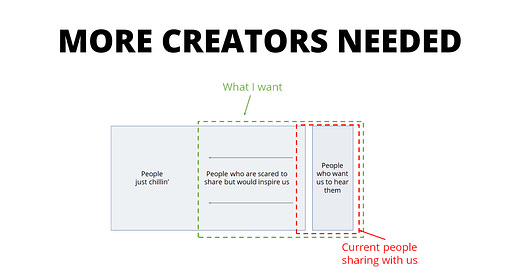







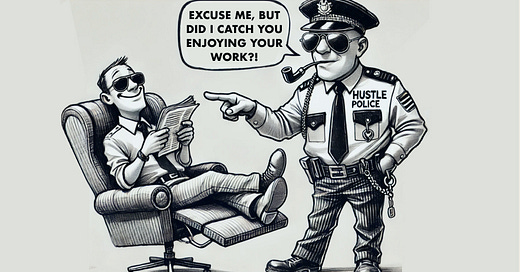


Hey Paul. First time reader, I found this inspiring, and it generated some ideas for action (as someone relatively new to writing consistently online).
However, I felt like the point of “overcoming fear” was underdeveloped. You listed a number of benefits to writing that all more or less resonate. But they don’t address the fear piece directly. I think lack of credentials holds some people back, but another fear that looms larger is this inhibition around upsetting others. Fear that if you don’t write something that is self-deprecating, politically correct, not underdog enough, you’ll get called out. There’s such an inhibition around being judged and ostracized (or worse) that permeates the public forum.
How do you step into that fear?
Good stuff, I agree with most of it! Cheers 💚 🥃